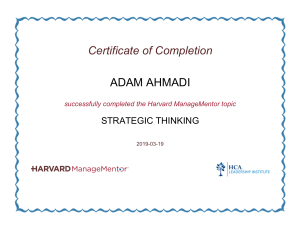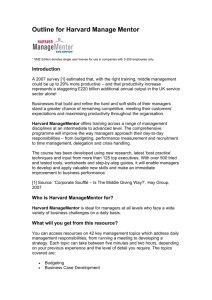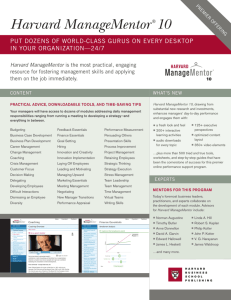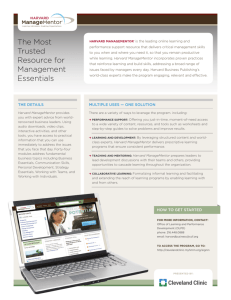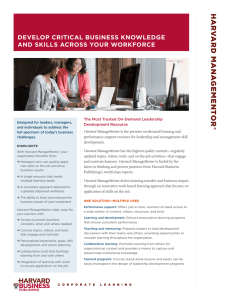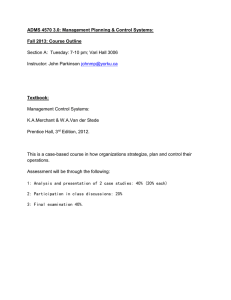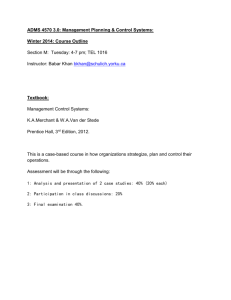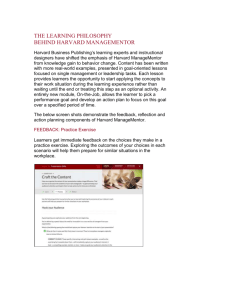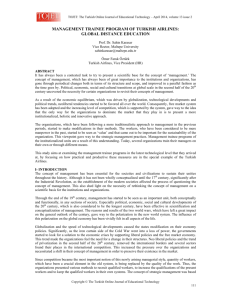Harvard Course List & Description.xlsx
advertisement
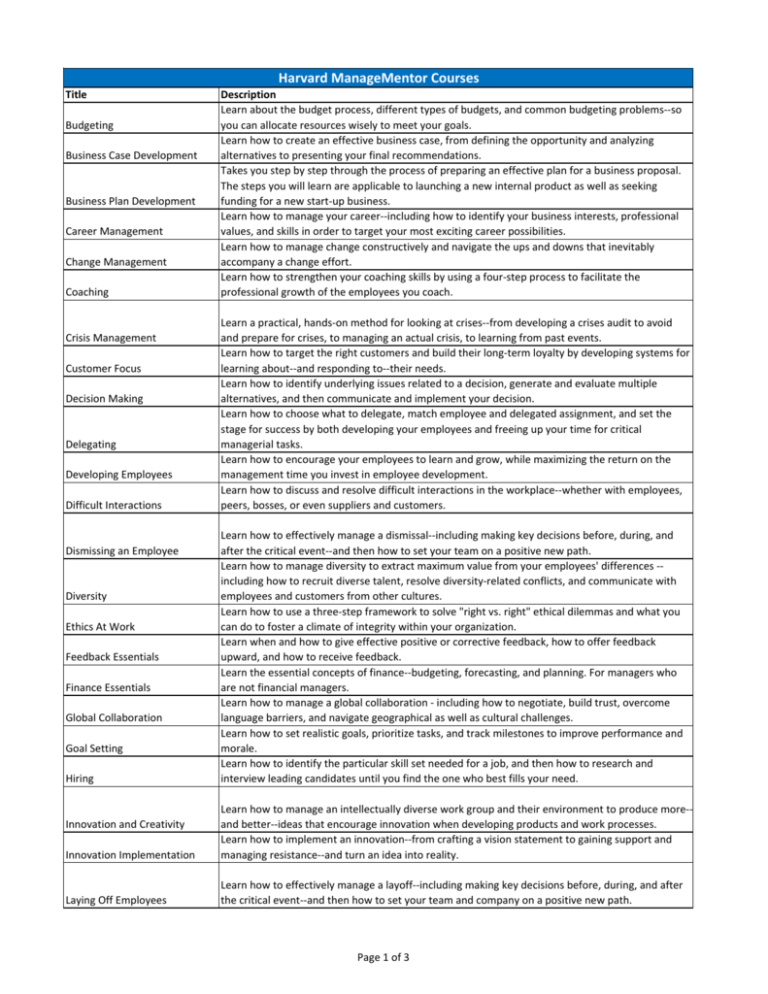
Harvard ManageMentor Courses Title Budgeting Business Case Development Business Plan Development Career Management Change Management Coaching Crisis Management Customer Focus Decision Making Delegating Developing Employees Difficult Interactions Dismissing an Employee Diversity Ethics At Work Feedback Essentials Finance Essentials Global Collaboration Goal Setting Hiring Description Learn about the budget process, different types of budgets, and common budgeting problems--so you can allocate resources wisely to meet your goals. Learn how to create an effective business case, from defining the opportunity and analyzing alternatives to presenting your final recommendations. Takes you step by step through the process of preparing an effective plan for a business proposal. The steps you will learn are applicable to launching a new internal product as well as seeking funding for a new start-up business. Learn how to manage your career--including how to identify your business interests, professional values, and skills in order to target your most exciting career possibilities. Learn how to manage change constructively and navigate the ups and downs that inevitably accompany a change effort. Learn how to strengthen your coaching skills by using a four-step process to facilitate the professional growth of the employees you coach. Learn a practical, hands-on method for looking at crises--from developing a crises audit to avoid and prepare for crises, to managing an actual crisis, to learning from past events. Learn how to target the right customers and build their long-term loyalty by developing systems for learning about--and responding to--their needs. Learn how to identify underlying issues related to a decision, generate and evaluate multiple alternatives, and then communicate and implement your decision. Learn how to choose what to delegate, match employee and delegated assignment, and set the stage for success by both developing your employees and freeing up your time for critical managerial tasks. Learn how to encourage your employees to learn and grow, while maximizing the return on the management time you invest in employee development. Learn how to discuss and resolve difficult interactions in the workplace--whether with employees, peers, bosses, or even suppliers and customers. Learn how to effectively manage a dismissal--including making key decisions before, during, and after the critical event--and then how to set your team on a positive new path. Learn how to manage diversity to extract maximum value from your employees' differences -including how to recruit diverse talent, resolve diversity-related conflicts, and communicate with employees and customers from other cultures. Learn how to use a three-step framework to solve "right vs. right" ethical dilemmas and what you can do to foster a climate of integrity within your organization. Learn when and how to give effective positive or corrective feedback, how to offer feedback upward, and how to receive feedback. Learn the essential concepts of finance--budgeting, forecasting, and planning. For managers who are not financial managers. Learn how to manage a global collaboration - including how to negotiate, build trust, overcome language barriers, and navigate geographical as well as cultural challenges. Learn how to set realistic goals, prioritize tasks, and track milestones to improve performance and morale. Learn how to identify the particular skill set needed for a job, and then how to research and interview leading candidates until you find the one who best fills your need. Innovation Implementation Learn how to manage an intellectually diverse work group and their environment to produce more-and better--ideas that encourage innovation when developing products and work processes. Learn how to implement an innovation--from crafting a vision statement to gaining support and managing resistance--and turn an idea into reality. Laying Off Employees Learn how to effectively manage a layoff--including making key decisions before, during, and after the critical event--and then how to set your team and company on a positive new path. Innovation and Creativity Page 1 of 3 Harvard ManageMentor Courses Leading and Motivating Managing Upward Marketing Essentials Meeting Management Negotiating New Manager Transitions Performance Appraisal A synopsis of the essential tasks of leadership: setting direction, aligning people, and motivating others. Learn how to recognize the skills and characteristics of effective leaders, create an inspiring vision, and energize people to support and work toward your goals. How well do you work with your supervisor? Gain insight into developing a mutually rewarding relationship, with skills for communicating and negotiating with your manager. Includes tips on presenting problems or opportunities to your supervisor and accepting responsibility for your proposed actions. Written especially for non-marketing managers, this module includes fundamentals that will help people throughout the organization better understand the importance of marketing and how it relates to them. A timesaving guide to planning and conducting meetings from start to finish. Covers preparation, keeping the meeting on track, and follow-up. Includes expert advice for dealing with problem behaviors exhibited by meeting participants. A practical guide to becoming an effective negotiator. Includes steps to guide you through the negotiation process: assessing your interests as well as those of the other party, developing opportunities that create value, avoiding common barriers to agreement, and implementing strategies to make the negotiation process run smoothly. Learn what it means to be a manager, as well as how to navigate the complex and often stressful transition from individual contributor to a new manager. Learn how to prepare for, conduct, and follow up on performance evaluations--in ways that link employee performance to your company's and group's goals. Strategic Thinking A review of financial and non-financial measures used in all areas of organizational performance. Addresses both standalone measures (including ROI, EVA, and BET) and measurement frameworks such as dashboards, quality models, and the Balanced Scorecard. Includes a systematic process for tracking performance of initiatives that can generate improvements across the organization. Master the art and science behind successful persuasion -- and begin changing others' attitudes, beliefs, or behavior to create win-win solutions. Formal authority no longer gets managers as far as it used to. To do their job -- accomplishing work through others -- managers must develop and use persuasion skills rather than simply issue orders. Sound advice on preparing and delivering presentations that command attention, persuade, and inspire. Includes rehearsal techniques as well as tips for creating and using more effective visuals. Also addresses the importance of understanding your objectives and your audience to create a presentation with impact. In this topic, you'll learn what business processes are; why improving them is essential; and how to carry out a business process improvement (BPI) initiative. Learn the nuts and bolts of project management, including project planning, budgeting, teambuilding, execution, and risk analysis. Covers useful tools and techniques such as GANTT and PERT charts, Work Breakdown Structure, and variance analysis. Why do employees stay with -- or leave -- their jobs? Learn strategies for attracting and keeping top performers, how to handle common obstacles to retention such as burnout and work/life imbalance, and how to develop programs that address the diverse needs and interests of your workforce. Practical advice for managers in charge of shaping and executing organizational strategy. Includes tips for analyzing opportunities, challenges, and the potential consequences of high-level action plans. Addresses identification of broad patterns and trends, creative thinking, analysis of complex information, and prioritization of actions. Strategy Execution Learn what strategy is, how senior management and units work together to develop strategy, and how units support a company's strategy by developing and executing action plans for strategic initiatives. In many companies, senior management and units are involved in the strategic planning process. Why? This ensures that a company's strategies -- both corporate and unit -- are tightly aligned and that successful implementation can follow. Performance Measurement Persuading Others Presentation Skills Process Improvement Project Management Retaining Employees Page 2 of 3 Harvard ManageMentor Courses Stress Management Team Leadership Learn the difference between positive stress that enhances productivity and negative stress that breeds tension, lowers productivity, and undercuts job satisfaction. Includes strategies for dealing with underlying causes of worry and stress, with tactical advice and coping mechanisms for immediate problem management. Learn how to establish a team with the right mix of skills and personalities and create a culture that promotes collaborative work. Covers steps to leading an effective team and includes innovative, easy-to-implement self-evaluation tools. Time Management Focus is essential to effective teamwork. Learn how to diagnose and overcome common problems such as poor communication and interpersonal conflict - that can impede team progress, learn to take corrective measures to remove team problems and improve team performance. This module will help you master effective time management techniques. Learn how to analyze how you currently spend your time and pinpoint opportunities for improvement, set goals, prioritize tasks, plan your time efficiently using scheduling tools, control time-wasters, and evaluate your schedule once it is underway. Virtual Teams Concrete suggestions for forming virtual teams, including assessing their technology and communication needs, structuring the team to build trust, and keeping the team on track. Writing Skills Skillful writing helps you accomplish your business objectives and extends your influence as a manager. Learn to create clearer, more effective written communications. Includes specific guidelines for preparing memos, letters, emails, and other common business documents. Team Management Page 3 of 3
